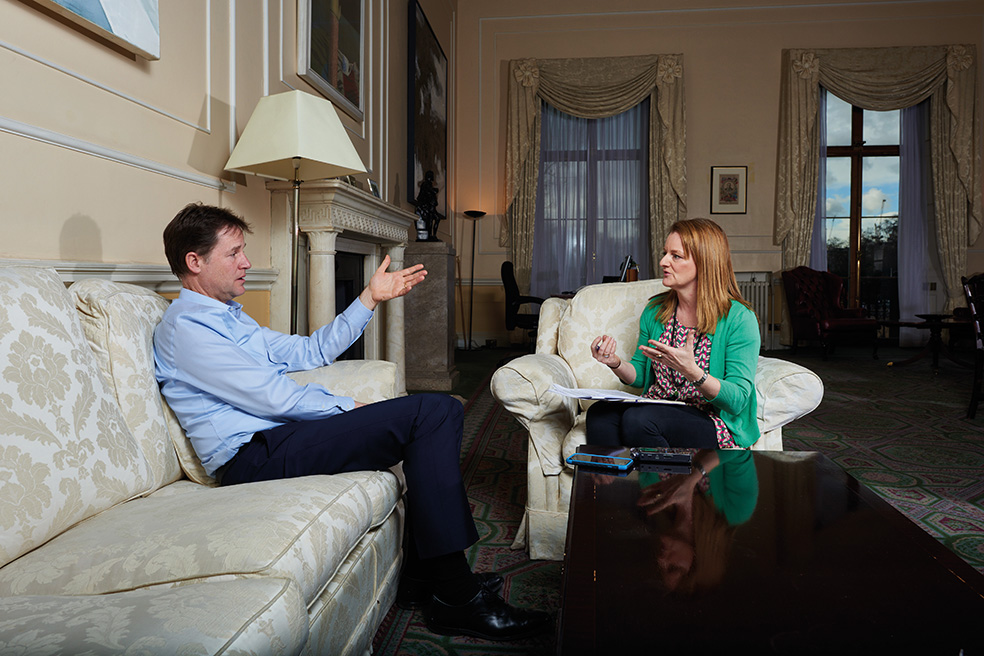Nick Clegg talks mental health
As the General Election nears, award-winning mental-health writer Martha Roberts talks to deputy Prime Minister Nick Clegg about his promises and how he intends to deliver them

Recently, I was in hospital overnight for a planned operation and the nurse came in with some painkillers. ‘The doctors said I can take this, too,’ I told her, showing her the small white tablet in my hand, explaining it was anti-psychotic medicine for my bipolar. Her face hardened. I could only imagine she was thinking something along the lines of: ‘Oh no, is this one going to cause merry hell on the ward tonight?’
If I’d told her it was a chemotherapy drug or a dose of insulin, I wager she would have been brimming with kindness. Instead, her demeanour drummed home the fact that I not only have a lifelong illness, but a condition that seems to bring with it a constant feeling of being judged.
Charities campaign tirelessly for an end to mental health stigma. We’ve all seen the emotional ‘Time to Change’ adverts. Sometimes it feels that they are making massive, confident strides, often catalysed by celebrities such as Stephen Fry revealing their struggles with mental illness and, sadly, others are linked to catastrophic news, like the recent suicide of Robin Williams.
Politically, mental health has been on the agenda of various governments for at least 20 years, with varying degrees of success. During that time, a few lone MPs have also stuck their heads above the parapet to champion this ‘unfashionable’ subject, including Charles Walker and Kevan Jones, who spoke out about their own mental health problems in 2012 (a 2008 MIND report revealed that of 650 MPs in the Commons, one in five admitted to having had a mental health issue at some point in their lives).
Despite this, the authors of a 2014 book Mental Health Policy For Nurses, state the ‘almost unanimous failure on the part of MPs to advocate for the mentally ill has seriously impeded the development of services and their availability and accessibility’. And the fact is, almost nine out of 10 people with mental health problems (87 per cent) say they still experience stigma and discrimination.
As both someone with Bipolar Affective Disorder and a journalist whose chief passion is mental health, this leaves me in a state of worried indignation. It seems we still have so far to go – when will radical change happen? With the General Election coming up, this would seem like a prime opportunity for politicians to nail their mental health policy colours to the mast. Will anyone do it? And more to the point, will they honour their commitments?
Nick Clegg, Deputy Prime Minister and LibDem leader, is something of a posterboy for this subject. He’s made no secret of his desire to bring treatment for mental health problems in line with physical health, making this a legal responsibility through the Health and Social Care Act 2012.
Mental health has been a crusade of his for years. His interest was born out of meeting a family in his constituency, whose daughter with an eating disorder was being desperately let down by mental health services. ‘Some people politely call it a “Cinderella service”,’ he tells me, as we sit in his office in Whitehall. ‘It’s worse than that – it’s almost an institutional form of cruelty, the way people are left in a state of great vulnerability and fragility to fend for themselves in a way that would be deemed completely unacceptable if it was a physical health problem.’
At a Mental Health Conference in January, Clegg unveiled a number of pledges for the LibDems in government, including treatment within two weeks of referral for people experiencing first-time psychosis, access to talking therapies within six weeks (18 weeks at an ‘absolute maximum’) for anxious or depressed people (‘the same as if you were waiting for an operation on your hip,’ he says) and, most ambitiously, a target for ‘zero suicides’, modelled on a programme in Detroit, in the US. In February, one of the LibDems’ five priorities for the next five years was revealed as ‘quality health care for all’, including ‘ending stigma around mental health and putting it on an equal footing with physical [health]’.
When we meet, the other parties are compiling their election pledges and, encouragingly, mental health is mentioned by most (see panel, right). But talk is cheap and funds are scarce. Although mental health problems account for 23 per cent of the burden of disease in the UK, spending on such services consumes only 11 per cent of the NHS budget, according to health charity The King’s Fund.
The charity also says that although the focus on the parity of esteem between mental and physical health is ‘highly welcome’ and specific achievements have been made in recent years (including the Improved Access to Psychological Therapies programme), it says ‘the increased attention now being placed on mental health has come late in the parliament, and there remains a gap between rhetoric and reality.’ Sufficient funding is needed, workforce shortages need to be addressed and investment in training and education is vital.
National duty
British political history is replete with stories of parties that came to power on impressive pledges, only to do a U-turn afterwards. Clegg, whose party pledges to put £500 million into mental health each year, says the problem is too big for any government to ignore.
‘We’re starting to reach a point of no return,’ he says. ‘I like to think we’ve got enough momentum going now that it’s not possible for any future government to turn back. The scale of it is such that it would seem to be incomprehensible why any government would not keep up with the changes we’ve embarked on. It’s something that affects one in four of our citizens. What more evidence do you need? It’s a national duty.’
What if he has any sway in the next administration? He says he’s ‘constantly reminded’ of the one thing he couldn’t deliver on – the abolition of university fees – but he adds that, heading towards the election, ‘I take what we put on the front page of our manifesto this time very seriously’, including putting mental health provision in line with physical health. It’s unambiguously, openly and overtly one of the priorities for the LibDems going into this election.’
As someone who uses mental health services, I think even more should be done. Clegg says that, in addition to his election mental health pledge, we could do with blurring some of the ‘artificial distinctions’ between adults and children, residential and community, and mental and physical’ and to start treating people like people, rather than ‘units that cross these entirely arbitrary boundaries’ – something that’s being addressed by the Department of Health in its recently launched Crisis Care Concordat. I completely agree.
Children, adolescents and ‘emerging adults’
It is these artificial boundaries that mean that, on turning 18, teens stop getting the same mental health provision they needed when they were 17 years and 364 days old, because the criteria for illness changes. I believe ‘emerging adults’ (aged 18-29) are heading for mental health crises, as the threshold for treatment is higher for adult services than it is for CAMHS (Child and Adolescent Mental Health Services). So, a young person may previously have received help, but won’t under AMHS (Adult Mental Health Services).
More needs to be done for this group, as well as for adolescents and children. The number of children turning up in A&E with mental health conditions has almost doubled in four years. In all, 17,278 under-18s attended A&E in England last year compared to 9,328 four years ago. Since 2010, funds to CAMHS have been cut by £50 million, prompting charity YoungMinds to say we’re sitting on a ‘mental health timebomb’.
Single-parent support
As a single parent with mental health issues, I think we need to be given more support to prevent feelings of isolation and to help foster good mental health in children (a 2007 study found single mums are significantly more likely to have a moderate-to-severe mental disability than partnered mothers). In February, single-parent organisation Gingerbread announced its Single Parents Decide pre-election campaign to highlight problems to politicians. Mental illness and the poverty it often engenders should be on the radar.
Mental health first aid
Clegg and I also talk about an Australian import and relative newcomer here – mental health first aid – where people are taught about the warning signs of mental illness and what to do about it in the workplace, school and social arenas. ‘You need to make sure people are identified much earlier, then referred for help much earlier than is the case now,’ he says.
Mental health first aid may help to achieve this by encouraging everyone to understand that such illnesses can affect people in a plethora of environments, and that it’s our responsibility to tackle our prejudices and use our energy to help people instead.
Compassion, in line with the Liberal tradition, is key, says Clegg. ‘If you want to create a compassionate society, you have to be open, and not try and resolve people’s problems in the closet. You don’t help people by sweeping their problems under the carpet, which has been the attitude towards mental health problems for a long period of time.’
Of all the politicians, Clegg appears to be a safe pair of hands to leave mental health policy in. He tells me ‘reading, laughter, exercise and kids’ is his own recipe for coping with his high-octane job. ‘I’ve got small children – I’m besotted with them,’ he says. ‘Anyone who has children knows they don’t half put any problems in the office into perspective!’
But whoever ends up in power this month, Clegg is realistic about how much commitment mental health is needs. ‘Sorting this out is like turning around a tanker,’ he says. ‘It won’t be one government, it won’t be one parliament. But if I can play a small role in trying to kick-start a cultural change, then I hope I’ll look back on it as being one of the things I’m most proud of.’
Where do the main political parties stand on mental health?
- Conservatives: The Conservatives have publicly declared mental health to be a priority and promise to put an extra £2bn into frontline health services across the UK.
- Labour: Labour say they will give greater priority to mental health services with the key principles of prevention, early intervention and better support. They are also pledging to end the ‘scandal of neglect of child mental health’.
- SNP: The Scottish National Party pledges to reduce the number of senior managers in the NHS by 25 per cent, streamline the work of health boards and implement increases in year-on-year NHS spending – but nothing specific about mental health.
- Plaid Cymru: Plaid Cymru say they will recruit 1,000 extra doctors to the Welsh NHS and will offer financial incentives for recruiting doctors to areas where there are shortages – but nothing specific about mental health.
- Greens: They plan to divert funding away from centralised facilities towards community healthcare, illness prevention and health promotion, as well as stopping privatisation, abolishing prescription charges and introducing a dedicated NHS Tax – but nothing specific about mental health.
- UKIP: They pledge to give an extra £3bn per year to the NHS, which includes increased funding for mental health services to improve access to treatment for adults and children. Clinicians will be encouraged to take a ‘whole person’ approach to physical and mental health, ensuring those diagnosed are given support.
MARTHA ROBERTS is an award-winning UK health writer and mental health blogger at mentalhealthwise.com
Photograph: Micha Theiner








